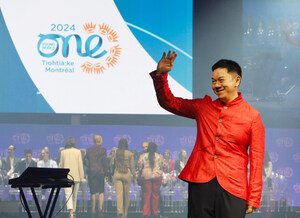NEW YORK, May 21, 2013 /PRNewswire/ -- Billions of dollars in potential US exports to a booming Chinese middle class can drive global economic growth and anchor the two countries to one another in the 21st century, spurring cooperation on a range of issues from fighting climate change to increasing bilateral investment. So found a major new bilateral study US-China 2022: Economic Relations in the Next 10 Years by the China-United States Exchange Foundation (CUSEF) released today.
(Logo: http://photos.prnewswire.com/prnh/20130521/NY18346LOGO )
The report was authored by an Executive Committee comprised of distinguished US and Chinese economists, with the guidance and support of a Steering Committee that includes business executives, former government officials, economists, and NGO representatives from both China and the US.
The study will be launched the week of May 20th through a series of high-profile events at the Asia Society in New York, at CSIS in Washington, D.C., and with the Chicago Council on Global Affairs in Chicago. Speakers at the Forums will include Dr. Henry Kissinger; Mayor Michael Bloomberg; former White House Chief of Staff John Podesta; Ambassador Cui Tiankai; Mayor Rahm Emanuel; and former Treasury Secretary Hank Paulson.
The report reached the following critical conclusions:
- By 2022 China's middle class is expected to number 630 million, an increase from 230 million in 2012.
- In 2022, US exports to China are projected to generate US$456 billion worth of GDP and more than 2.54 million jobs in the US, an increase of 1.81 million over the comparable 2010 figure.
- The US can create $35 billion of GDP and 610,000 US jobs by 2022 if visa restrictions are lifted, allowing up to 10 million Chinese travelers to visit the US per year, up from 1.1 million in 2011;
- In 2022, the US is expected to remain the largest economy in the world, with a GDP of US$21.1 trillion, compared to a Chinese GDP of US$17 trillion.
The report recommended the following policies:
- Free Trade Agreement: Both countries should launch a study of the feasibility and the benefits of a bilateral free trade agreement. This study should be completed within one year, and pending the findings, negotiations should be initiated.
- Bilateral Investment Treaty: The US and China should complete the negotiations for a bilateral investment treaty within one year.
- IPR: China should establish a special national court exclusively for intellectual property disputes.
The study was conceived by Tung Chee Hwa, Chief Executive of the China-United States Exchange Foundation and a former Chief Executive of Hong Kong, to explore potential areas for increased bilateral cooperation, the most beneficial ways forward for both countries consistent with their values and interests, and projections of what can be achieved from a continued economic relationship in 2022 — the 50th anniversary of President Richard Nixon's visit to China.
"Today, the US and China are each other's second largest trading partners, and the stakes have never been higher," said Tung. "This study comes at a critical juncture in the bilateral relationship; a time when the two countries can either continue unprecedented cooperation or can become sidetracked by an increasing number of frictions and misunderstandings that threaten to complicate the future development of this critical economic partnership."
More importantly, the study looks forward to how the economies of the United States and China are likely to develop over the next decade and how even greater economic benefits can accrue to both countries in the future. Both countries want to establish a pattern of secure, high-quality, sustainable growth and employment for their people, and this study demonstrates that the bilateral relationship, built and adapted well over time, can make a material contribution to that shared goal.
US-China 2022 consists of an analysis of the economic relationship over the course of the last three decades, projections for the relationship through 2022, as well as a targeted approach to key issues within the bilateral relationship. The rise of China's middle class, the cooperation in tourism, and the importance of intellectual property rights are among the topics covered in this report.
Executive Committee
The Executive Committee is responsible for planning, organizing and researching the study. The report is divided into two parts. Part I forms the main report, while Part II consists of supporting sub-reports for Part I. The Executive Committee takes overall responsibility for Part I. As for Part II, the Executive Committee identified topics of special interest to be researched and invited individual authors to contribute their work independently.
Co-Conveners
Victor K. FUNG
Chairman, The Fung Group
Lawrence J. LAU
Ralph and Claire Landau Professor of Economics, The Chinese University of Hong Kong Kwoh-Ting Li Professor in Economic Development, Emeritus, Stanford University
Members
Michael J. BOSKIN
Tully M. Friedman Professor of Economics and Senior Fellow at the Hoover Institution, Stanford University
FAN Gang
Director, National Institute of Economic Research Chief Researcher, China Center For International Economic Exchanges
Professor of Economics, Peking University and the Graduate School of Chinese Academy of Social Sciences
HAI Wen
Vice President, Peking University
Chancellor of Shenzhen Graduate School, Peking University
Founding Dean and Professor of Economics, HSBC Business School, Peking University
Michael SPENCE
Professor of Economics, Leonard N. Stern School of Business at New York University
Senior Fellow at the Hoover Institution and the Philip H. Knight Professor Emeritus of Management in the Graduate School of Business, Stanford University
Recipient of the Nobel Prize in Economic Sciences in 2001
About the China-US Exchange Foundation
The China-United States Exchange Foundation was established in 2008 with the purpose of further improving communications and enhancing understanding between the peoples of China and the United States. In particular, the Foundation is committed to helping the people of both countries recognize their many areas of common interest and to identifying and developing additional areas potential cooperation.
The Foundation does this by fostering open dialogue between opinion leaders from the governments, think tanks, academia, media and the business communities of both countries, particularly dialogue based on Foundation-supported research. Through programs undertaken in partnership with Chinese and American think tanks, educational and other institutions, the Foundation facilitates policy research, supports academic exchanges, and creates platforms, such as conferences and seminars, to encourage the exchange of insights and opinions from public- and private-sector representatives on issues relating to China-United States relations.
For further information, please visit: www.uschina2022.com
For press inquiries, please contact Alison Bradley at [email protected] or 1-646-712-0699.
SOURCE China-United States Exchange Foundation
WANT YOUR COMPANY'S NEWS FEATURED ON PRNEWSWIRE.COM?
Newsrooms &
Influencers
Digital Media
Outlets
Journalists
Opted In




Share this article